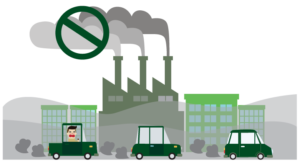Have you experienced the effect of climate change in the world around you?
Climate change is described as a significant and lasting change in the planet’s weather patterns over a long period. The science of global climate change has long determined that this cause is due to the rise in temperature of the global atmosphere. Rapid growth fueled by human activities over the past two centuries has increased greenhouse gasses in Earth’s atmosphere, making extreme weather patterns all over the world a more common occurrence.
What are Greenhouse Gasses and how do they affect me?
Greenhouse gasses occur naturally in the atmosphere. They include:
- Water vapor
- Carbon dioxide
- Nitrous oxide
- Methane
- Chlorofluorocarbons
Greenhouse gasses let the sun’s light in and keep the heat from escaping, like the glass walls of a greenhouse. However, with more greenhouse gasses gathering in the atmosphere, including those from car exhaust, coal power plants, and factory emissions that form airborne particles and ground-level ozone or smog, more heat gets trapped, raising Earth’s temperature. This phenomenon is known as the Greenhouse Effect. Changes in the Earth’s temperature, even by a degree, have an extreme effect on our ecosystems. Climate change poses consequences to our oceans, our weather, our food sources, and our health.
What are the effects of Climate Change?
Climate change affects our oceans by prompting ice sheets to melt, causing the oceans to rise and thereby flooding vulnerable coastal regions all around the world. The warming waters also have negative effects on marine wildlife, including ocean-dwelling food sources for humans. About 1 billion people worldwide rely on the ocean for their primary source of protein.
Warmer temperatures affect our weather, causing harsher storms, floods and longer and more frequent droughts. As a result, growing crops becomes more difficult, and the areas where animals and plants are able to live is reduced. This greatly affects not only those whose livelihoods depend on farming and fishing, but all people on Earth.
Climate change also affects our health. In urban areas, for example, a warmer atmosphere creates an environment more likely to trap smog. When sunlight hits emitted chemicals from car exhaust, coal power plants, and factory emissions they form airborne particles and ground-level ozone—or smog. Exposure to the high level of smog in urban areas can cause health problems such as asthma, lung cancer, and heart disease.
What can we do to reduce the consequences of climate change?
Tackling climate change as individuals may seem daunting, but every one of us can make a conscious effort to reduce our own consumption and prioritize behavior that is conscious to the environment:
- How large is your carbon footprint? Calculate your carbon footprint as a means to better understand how you can reduce your CO2 emissions. Use this tool: https://coolclimate.berkeley.edu/calculator
- Spread the word: Encourage your friends, family, and co-workers to reduce their carbon footprint in small ways, such as biking, walking, or taking public transit for shorter distances rather than driving.
- Prioritize clean energy: Choose Clean Power Alliance as your energy provider to opt into a renewable energy source when powering your home. Thanks to California’s Community Choice Aggregation law, consumers have the right to pick their energy provider. Learn more here: https://cleanpoweralliance.org/rateoptions/
- Purchase an electric vehicle and take advantage of the Paramount’s EV charging infrastructure. Did you know that by 2036, all sales of new passenger vehicles in California must be EVs or plug-in hybrid vehicles? The State of California offers EV rebates: https://cleanvehiclerebate.org/en
- Food choices can reduce greenhouse gas emissions: Buy local from farmers when possible, eat less meat and more plant-based foods, reduce food waste, and compost any uneaten food.
- Waste has its place – sort your trash properly into the organic/green waste bin, the recycling bin and the landfill bin. Organic recycling is new to Paramount through California’s SB 1383 law; click here to read more: https://paramountenvironment.org/organicwaste/
- Dress climate smart: Buy fewer new clothes and wear them longer. Seek out sustainable labels rather than fast fashion, and use rental services for special occasions rather than buying new items that will only be worn once. Recycle or donate your used clothes and repair them when necessary.
- Invest in energy-efficient household appliances. Did you know that your washer, dryer, and dishwasher can be a major source of energy consumption, especially when they’re older? Save money and energy by upgrading to a high-efficiency model.
- Reduce your water waste. Here are some tips on how to be more mindful of your water usage: https://paramountenvironment.org/water-conservation/
- Remember the 5 Rs: Refuse (what you don’t need), reduce (where you can), reuse (what you have), repurpose (what can be), and then, lastly, recycle (as a last resort).
With a marked reduction of manmade greenhouse gasses constantly being released into the atmosphere, Earth will have a chance to cool down. We urge you to think about the effects of climate change on yourself and your community. How can you make a conscious effort to reduce your carbon footprint and make the world a better place for generations to come?

